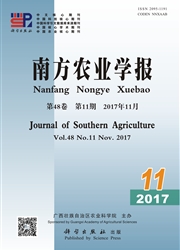

 中文摘要:
中文摘要:
【目的】研究抗除草剂转基因水稻及其相应的非选择性除草剂草铵膦对褐飞虱取食和产卵行为的影响,为转Bar基因水稻的生态安全性评价提供科学依据。【方法】以褐飞虱[Nilaparvata lugens (Stl)]为研究对象,以转Bar基因水稻Bar68-1、非转基因亲本对照水稻D68以及感虫对照水稻TN1为研究材料,并在转基因抗除草剂水稻上进行喷施0.5%草铵膦处理,对各处理褐飞虱的取食量、取食选择性和产卵选择性进行比较。【结果】褐飞虱在D68上的着虫率和取食量与TN1相比差异不显著,但产卵选择率显著低于TN1;褐飞虱在Bar68-1上的取食量、着虫率和产卵选择率与D68相比差异不显著;喷施0.5%草铵膦处理对褐飞虱取食量、取食选择性的影响与清水对照相比差异不显著,但对褐飞虱的产卵选择率、卵块数和卵粒总数有一定影响,均显著低于清水对照。【结论】抗除草剂转基因水稻Bar68-1对褐飞虱的取食和产卵行为没有影响。
 英文摘要:
英文摘要:
[Objective]The impacts of herbicide resistant transgenic rice and glufosinate on feeding and oviposition be- havior of brown planthopper Nilaparvata Ingens (St~l) (BPH) were studied to provide scientific references for ecological safety evaluation of transgenic rice with Bar gene. [Method]With the BPH as research object, the genetically modified herbicide-tol- erant (GMHT) rice Bar68-1, non-GM rice D68 and TN1 were treated by 0.5% glufosinate to compare their feeding amount, selectivity of feeding and oviposition of BPH on each treatment. [Result]There were no significant differences between Bar68-1 and D68 on feeding selectivity, honeydew excreted and oviposition preference of BPH. Bar68-1 and TNI shared similarity in honeydew excreted and feeding amount, while the viposition selection ratio of D68 was lower than that of TN1. There was no significant difference between the treatments of glufosinate and water control on selectivity and honeydew excreted of BPH feeding except for oviposition preference of BPH. It was lower in number of egg mass, total number of eggs and oviposition se- lection ratio for treatment of glufosinate than those of water. [Conclusion ]Herbicide-tolerant transgenic rice Bar68-1 has no marked effect on feeding and oviposition behavior of BPH.
 同期刊论文项目
同期刊论文项目
 同项目期刊论文
同项目期刊论文
 期刊信息
期刊信息
